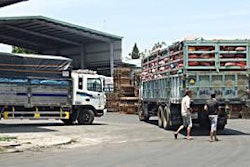Tanzania is launching two new research initiatives geared towards fighting mycotoxin contamination in crops — the first initiative will document the extent of mycotoxin contamination in food, and the second will develop a comprehensive and lasting solution to reduce mycotoxins in the country to improve the health and livelihoods of families and reduce loss of income from banned trade of contaminated food.
The first project, a six-month research study funded by the United States Agency for International Development under the Feed the Future initiative, will establish the extent and spread of mycotoxin contamination of maize and cassava at the homestead and in markets, focusing on Dodoma and Manyara. The second project seeks to develop a safe and natural biocontrol technology that can effectively reduce aflatoxin contamination of maize and groundnut in the field and during storage. The biocontrol project is also being implemented in Ghana, Mali and Nigeria, and will focus on developing biocontrol regional products targeting other countries in West, East and Southern Africa.














